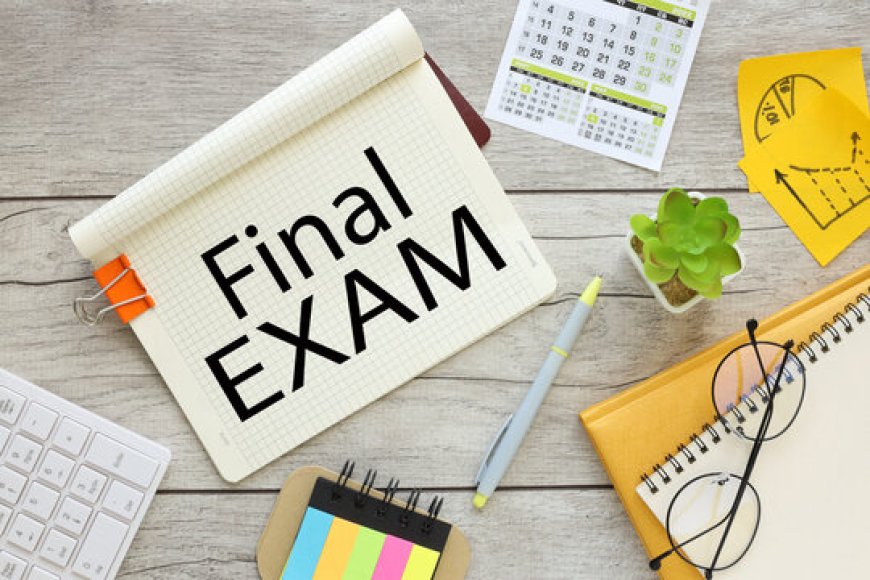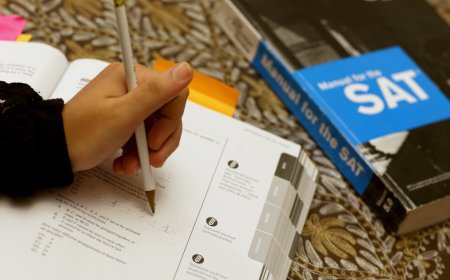How to Ace Your Exams Without Burning Out
To perform well in exams without feeling overwhelmed, it’s important to balance effective study habits with self-care. Build a clear study routine, use active learning methods, and make time for rest, good nutrition, and exercise. Reducing stress through relaxation, peer support, and study groups also plays a key role in staying mentally healthy during exam preparation.

How to Ace Your Exams Without Burning Out" is a comprehensive guide aimed at helping students navigate the academic pressures associated with exam preparation while maintaining their mental and emotional well-being. Burnout, characterized by chronic stress and exhaustion, is a prevalent issue among students, particularly during high-stakes exams, with studies indicating that nearly 97% experience some level of this debilitating condition.[1][2] This guide addresses the critical balance between achieving academic success and fostering self-care practices that can prevent burnout.
The article delves into effective study techniques that enhance learning and retention, such as active recall, spaced repetition, and the Feynman Technique, all of which help students engage more deeply with their materials.[3][4] Additionally, structured study methods, including the Pomodoro Technique and various note-taking strategies, are recommended to improve focus and efficiency. Collaborative learning through study groups is also highlighted as a way to reinforce understanding and motivation among peers, creating a supportive academic environment.[5]
In tandem with study strategies, the guide emphasizes the importance of self-care and well-being. It advocates for practices such as mindfulness, physical activity, and healthy eating, which collectively contribute to improved mental health and academic performance.[6][7] The necessity of establishing a conducive study environment, setting boundaries, and reflecting on personal study habits are underscored as essential components in managing stress and optimizing study efforts.
Prominent controversies in the discourse surrounding academic performance and mental health involve the pressures imposed by educational systems and societal expectations, which can exacerbate burnout among students. By providing practi- cal tools and techniques, "How to Ace Your Exams Without Burning Out" offers a roadmap for students to excel academically while prioritizing their overall well-being, thereby addressing a significant challenge faced by many learners today.
Understanding Burnout
Burnout is a significant psychological state characterized by physical, emotional, and mental exhaustion, often resulting from chronic stress and overwork[1]. It manifests as increased mental distance from one’s responsibilities, feelings of negativity, low self-esteem, and a profound depletion of energy[8]. Academic burnout, in particular, arises from the pressures of coursework, extracurricular activities, and the psycho- logical toll of continuous learning. Students often experience emotional exhaustion, a tendency to depersonalize their educational experience, and a diminished sense of personal accomplishment[8]. Research indicates that nearly 97% of students report experiencing some level of burnout during high-stakes exam periods, highlighting the widespread nature of this issue[2].
The symptoms of academic burnout extend beyond mere tiredness; they can include fatigue, insomnia, decreased motivation, irritability, and even psychosomatic issues such as headaches and muscle tension[9]. These symptoms can severely impact academic performance, leading to increased anxiety, feelings of disinterest in school subjects, and trouble sleeping[10]. Additionally, a lack of self-care and the failure to recognize the signs of burnout can exacerbate these issues, resulting in a cycle of stress and exhaustion that is difficult to escape[11][9].
Preventive measures and effective strategies can help combat burnout. Developing a consistent study routine, engaging in physical exercise, ensuring a balanced diet, and prioritizing self-care are essential steps for students to maintain their mental well-being during intense study periods[12][10]. By recognizing the signs and symp- toms of burnout early and implementing these strategies, students can improve their resilience against the pressures of academic life.
Study Techniques for Success
Effective study techniques play a crucial role in helping students achieve academic success while minimizing stress and burnout. By adopting strategies that enhance learning and retention, students can maximize their study efficiency and foster a deeper understanding of the material.
Active Learning Strategies
Active Recall and Spaced Repetition
One of the most effective learning methods is active recall, which requires students to actively retrieve information from memory rather than passively reviewing mate- rials. This approach significantly enhances retention and comprehension, allowing students to identify areas needing more focus.[3] Coupled with spaced repetition, where students review material at increasingly longer intervals, this technique helps ensure that information remains fresh and accessible in long-term memory.[3]
The Feynman Technique
The Feynman Technique involves explaining a concept in simple terms as if teaching it to someone else, often a child. This method not only reinforces understanding but also highlights areas that require further study.[4] By adding personal examples, students can enhance their engagement with the material, making the learning process more enjoyable and effective.
Structured Study Methods
Note-Taking Techniques
Adopting effective note-taking methods is essential for condensing large amounts of information into manageable content. The Cornell Method organizes notes into sections for main ideas, key points, and summaries, making it particularly beneficial for structured subjects like law and humanities.[4] Other techniques such as the Outline Method and Mapping Method are useful for organizing information logically and visually, respectively, aiding in comprehension across various subjects, including history and science.[4]
The Pomodoro Technique
The Pomodoro Technique, which encourages focused study sessions of 25 minutes followed by 5-minute breaks, has been shown to improve productivity and reduce feelings of burnout. By alternating periods of work with short breaks, students can maintain their focus and motivation over longer study periods.[3]
Collaborative Learning
Study Groups
Forming study groups can foster a collaborative environment that enhances mo- tivation and accountability. Engaging in discussions, problem-solving, and mock exams collectively helps reinforce knowledge and build confidence among peers. The dynamic nature of group study allows students to draw on each other's strengths and celebrate collective achievements, creating a supportive atmosphere conducive to learning.[5]
Practice and Feedback
Use of Practice Tests
Incorporating practice tests into study routines is a highly effective strategy for exam preparation. These tests not only familiarize students with exam formats and question types but also help them refine their time management skills.[5] High-quality practice
Self-Care and Environment
Maintaining a well-organized and clutter-free study environment can greatly con- tribute to effective studying. An orderly space minimizes distractions and enhances concentration, creating a calm atmosphere conducive to learning.[5] Additionally, prioritizing self-care through proper breaks and mental health practices is vital for sustaining motivation and preventing burnout during intense study periods.
By employing these varied and effective study techniques, students can optimize their learning processes, achieve better academic results, and maintain a healthier balance in their academic lives.
Maintaining Well-Being
Maintaining personal well-being is crucial for academic success and can significantly reduce the risk of burnout during exam preparation. This section outlines several strategies to enhance well-being while studying.
Delegate Responsibilities
One effective way to maintain balance is to identify tasks that can be delegated to others, whether at work or home. Sharing responsibilities can lighten one's load and reduce stress. Engaging family members, such as having children help with chores, not only eases individual burdens but can also strengthen familial bonds through shared responsibilities[1].
Prioritize Self-Care
Self-care is an essential component of a successful study routine. Engaging in practices like mindfulness meditation before and after study sessions can enhance learning capabilities and mental clarity. Additionally, maintaining adequate sleep, exercising regularly, and consuming a healthy diet are non-negotiable aspects of
Healthy Eating Habits
Managing one’s diet plays a pivotal role in sustaining energy levels throughout the day. Balanced meals comprising fruits, vegetables, whole grains, and lean proteins can help maintain consistent energy, while excessive caffeine and sugary snacks should be avoided to prevent energy crashes[6][7]. Incorporating regular meal times and staying hydrated also contribute to overall well-being.
Mindfulness and Stress Management
Incorporating mindfulness techniques can aid in stress management. Simple prac- tices, such as mindful breathing or body scan meditations, allow individuals to reconnect with their emotions and reduce anxiety[13][14]. These exercises can be performed anywhere and help cultivate a calm mental state, which is beneficial during intensive study periods.
Physical Activity
Regular physical activity is another cornerstone of maintaining well-being. Aim for at least 30 minutes of exercise most days, as activities like walking, cycling, and yoga have been shown to reduce stress and improve mental health. Even short exercise breaks can enhance focus and concentration during study sessions[7][15].
Intentionality and Reflection
Setting daily intentions can also improve one’s approach to study and self-care. By consciously deciding to be kind to oneself and checking in throughout the day, indi- viduals can enhance their emotional resilience and maintain a positive mindset[16]. This practice encourages greater awareness of one’s actions and their impact on mood and productivity.
Study Environment
Creating an optimal study environment is essential for enhancing concentration, focus, and overall productivity during exam preparation. Each prospective examinee has unique preferences and requirements for their study atmosphere, making it crucial to find a suitable space that fosters maximum concentration and minimizes distractions[5].
Importance of a Distraction-Free Environment
A distraction-free study environment significantly impacts an individual's ability to absorb and retain study materials. For some, a serene and quiet atmosphere allows for deep concentration, while others may thrive in a space with moderate background noise, which can stimulate engagement and cognitive processes[5]. Regardless of personal preferences, it is vital to create a study space that meets individual needs, considering factors such as noise levels, lighting, comfort, and the availability of necessary study resources[5][4].
To minimize distractions, prospective examinees should keep electronic devices like phones away, turn off televisions, and take scheduled breaks to avoid burnout. Additionally, organizing the study area to ensure it is tidy and free from clutter can further enhance focus and efficiency[4][17].
Setting Boundaries and Organization
Establishing boundaries within shared spaces can help reinforce a sense of focus and separation from distractions. A dedicated study area or specific study hours can help mitigate interruptions from external sources[5][4]. Furthermore, creating a well-organized study space contributes to a more effective exam preparation strategy, facilitating better focus and retention of information[17].
Active Learning Techniques
In addition to a conducive study environment, utilizing active learning techniques can further improve retention and understanding. Methods such as mind mapping, flashcards, and teaching concepts to others reinforce learning and clarify gaps in knowledge[17][2]. By actively engaging with the material, individuals can enhance their comprehension and solidify their understanding.
Balancing Study Time and Other Commitments
Finding the right balance between study time and other commitments is also essenti- al. This may require adjusting work hours, dedicating specific blocks of time for study, or using weekends strategically to create a study routine that accommodates both personal and professional obligations[5].
Test-Taking Strategies
Preparation Techniques
To set yourself up for success on exam day, it's crucial to prepare adequately in the week leading up to the test. Establishing a routine that includes 7-8 hours of sleep per night, reviewing practice questions, and simulating exam conditions can significantly alleviate test anxiety[18][17]. Additionally, engage in regular physical exercise and maintain a balanced diet to support your overall well-being during this critical time[18].
Day of the Exam
On the day of the exam, several strategies can enhance your performance. Arriving early allows you to acclimate to the environment and manage any last-minute tasks, such as using the restroom or calming your nerves[18][19]. A healthy breakfast is essential, as it provides the necessary energy to maintain focus throughout the test. It is advisable to avoid excessive caffeine, which can heighten anxiety levels[18].
Practicing relaxation techniques, such as deep breathing and visualization, can help to maintain a calm mindset as you begin the test[5].
During the Test
Once the exam starts, listen carefully to the instructions provided. This is vital as
Managing time effectively during the test is essential; practice tests can help refine this skill by allowing you to develop a sense of pacing and strategy for answering different types of questions within the allotted time frame[5].
If you encounter anxiety, take a moment to breathe deeply and refocus. Remember that you are in control, and it's important to stay present rather than dwell on past performance or future outcomes[18][20]. Changing positions occasionally can also help maintain comfort and reduce stress during the exam[18].
Post-Test Reflection
After completing the exam, reflect on your performance as a learning opportunity rather than a definitive measure of your capabilities. Each test is a chance to assess what strategies worked well and what areas may need improvement for future assessments[21]. This mindset can help mitigate anxiety and encourage a more positive approach to learning and test-taking.
Resources and Tools
Study Strategies
To enhance exam preparation, students can adopt several effective study strategies. First, the SQ3R method Survey, Question, Read, Recite, Review—serves as a valuable technique for identifying key facts and retaining information from textbooks- [22]. Additionally, organizing content by grouping it into specific areas based on chapters can make studying more manageable[23]. Writing practice questions in various formats, including multiple choice and essay types, can further simulate the exam experience and improve retention[23].
Mindfulness Practices
Incorporating mindfulness into daily routines can significantly alleviate exam stress. Mindfulness practices, such as mindful breathing and body scans, promote aware- ness of thoughts and feelings without judgment, which can help reduce test anxiety- [24][13]. Various apps, including Insight Timer and Headspace, offer guided medi- tations and exercises aimed at enhancing focus and overall well-being[25]. Setting reminders to practice mindfulness at specific times can also create a more consistent routine, fostering a calmer mindset during study sessions[13].
Productivity Tools
Utilizing productivity tools can streamline the study process. Apps like Forest can help maintain focus, while Trello can assist in managing study tasks[7]. A clean and organized study space is crucial for minimizing distractions and ensuring easy access to materials[5].
Seeking Help
When difficulties arise, seeking help from professors, tutors, or classmates can clarify challenging concepts and introduce new study strategies[7]. Participating in group study sessions not only facilitates learning through shared perspectives but also makes the study experience more engaging[26].
By integrating these resources and tools into their study habits, students can enhance their learning efficiency and better prepare for exams without succumbing to burnout.
References
[1] : Managing Burnout Through Effective Time Management - Medium
[2] : My 4-step guide to dealing with academic burnout
[3] : What Are Strategies to Avoid Burnout During Intense Studying?
[4] : How to Combat Academic Burnout | UGA Online
[5] : 12 Tips To Avoid Academic Burnout | Admissions and Aid | RIT
[6] : Strategies to Combat Burnout During Intense Studying
[7] : 10 Study Tips for the Perfect Academic Comeback *Without* Burning ...
[8] : 9 Study Skills and Strategies to Overcome Test Anxiety
[9] : Top 7 Study Techniques That Actually Work For University Students [10]: Addressing Bar Exam Stress: Practical Tips for Success
[11] : How to Study Consistently Without Burning Out - Alexander Young
[12] : 10 Proven Strategies to Ace Your Exams Without Stress - Sourcely
[13] : 10 Simple Mindfulness Exercises to Add to Your Daily Routine
[14] : 10 mindfulness strategies to prevent stress at exam time
[15] : Studying without stress: Ways to achieve an optimal Work-Life Balance
[16] : 5 Simple Mindfulness Practices for Daily Life
[17] : Exam preparation: Ten study tips | Top Universities
[18] : Strategies To Better Manage Test Anxiety | The City College of New ...
[19] : 14 Tips for Test Taking Success - Harvard Summer School
[20] : Relaxation Techniques for Exam Anxiety: 8 Most Useful ... - Tutopiya
[21] : Test Anxiety - Academic Resource Center
[22] : 10 Effective Study Tips and Techniques to Try This Year | USAHS
[23] : Exam Study Strategies | The Institute for Learning and Teaching
[24] : Effects of mindfulness on test anxiety: a meta-analysis - Frontiers
[25] : A Teacher's Guide to Applying Mindfulness in the Classroom










































